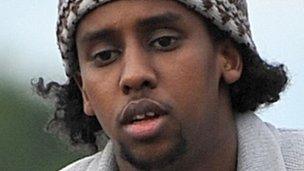'Tougher restrictions' on terror suspects after burka escape
- Published

Current measures used to monitor terror suspects include electronic tagging
The government is examining the possibility of toughening up restrictions on terror suspects, the BBC understands.
It comes after suspect Mohammed Ahmed Mohamed fled from a west London mosque last week disguised in a burka.
Measures being considered include specifying which mosques suspects can attend and limiting the amount of time they spend inside.
Mr Mohamed had been subject to the restrictions for nearly two years.
It emerged earlier this week he was facing charges over alleged breaches of the terrorism prevention and investigation measures order (TPim) prior to his disappearance.
Mr Mohamed is believed to have close links to al-Shabab, the Somali insurgent group that raided Nairobi's Westgate shopping mall in September, resulting in 67 deaths, but officials said there was not enough evidence to bring a criminal case against him in court.
'Increase overnight curfews'
The coalition government brought in TPims in 2012 to replace the more restrictive control orders, which had been devised by the previous Labour administration.
TPims restrict the movements of people thought to pose a risk to the public, but who cannot be tried for reasons of national security and who cannot be deported.

Mohammed Ahmed Mohamed is the second terror suspect under a TPim to go missing
The measures include electronic tagging, reporting regularly to the police and facing "tightly defined exclusion from particular places and the prevention of travel overseas".
Mr Mohamed disappeared from the An-Noor Masjid and Community Centre in Acton on 1 November after cutting off his electronic tag.
Private security firm G4S - which was responsible for the tag - contacted the Home Office, which alerted police, but Mr Mohamed had fled before they arrived.
Mr Mohamed's restrictive surveillance regime, which included a 21:30 GMT curfew, was due to expire by January.
The BBC's Simon Clemison said there was no suggestion that TPims should be replaced, rather that they should be used to their full effect.
As well as restricting which mosques suspects could attend and the amount of time they could spend in them, moving suspects from one part of a city to another was said to be under consideration, he said.
Increasing the number of times suspects had to report to police stations and extending overnight curfews to the legal maximum length of 10 hours are also being considered, he added.
The Mail on Sunday reported, external Home Secretary Theresa May was seeking to "significantly strengthen" conditions placed on suspects.
Lord Carlile of Berriew QC, who was the government's independent reviewer of counter-terrorism law, told the Sunday Telegraph , externalthe introduction of TPims had made Mr Mohamed's escape easier.
Under the previous control orders he could have been forced to live outside London and restricted to prayers at a mosque away from known associates, Lord Carlile told the newspaper.
And he urged the prime minister "to take personal charge" to make the restrictions on the suspects stricter.
- Published8 November 2013
- Published6 November 2013
- Published4 November 2013
- Published4 November 2013